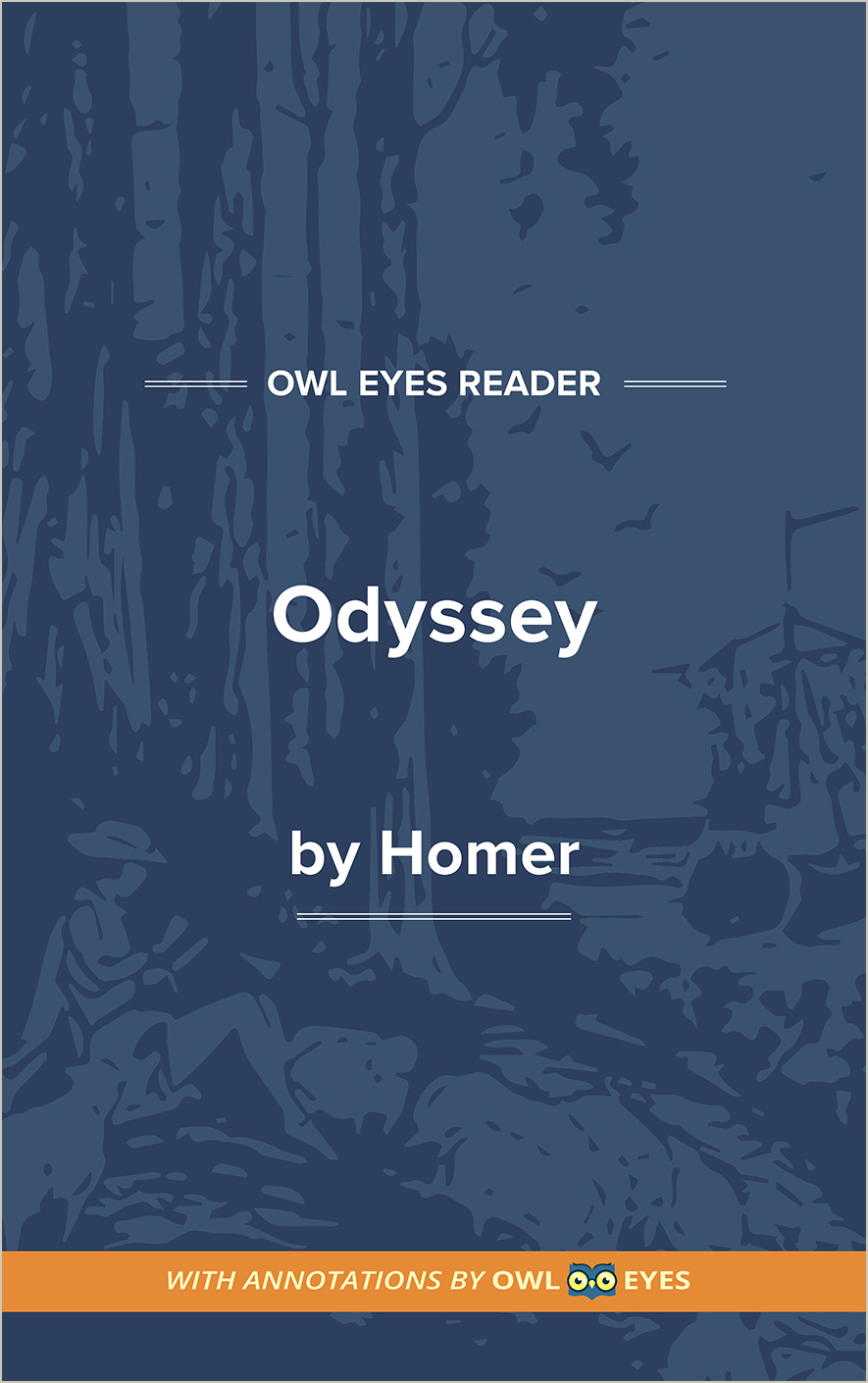Analysis Pages
Themes in The Odyssey
Themes Examples in The Odyssey:
Book I
🔒"for he feared his wife's resentment..." See in text (Book I)
"But in his heart he knew..." See in text (Book I)
"she flew away like a bird..." See in text (Book I)
"by fair means or foul..." See in text (Book I)
"the gods in their displeasure have willed it otherwise..." See in text (Book I)
"mixing wine with water in the mixing-bowls..." See in text (Book I)
"men lay blame upon us gods..." See in text (Book I)
"prevented them from ever reaching home..." See in text (Book I)
Book II
🔒"Tyro, Alcmena, Mycene..." See in text (Book II)
"whether she would or no..." See in text (Book II)
"tambour frame..." See in text (Book II)
"was one of the suitors..." See in text (Book II)
"no meeting of our councillors until now..." See in text (Book II)
Book III
🔒"board of a ship..." See in text (Book III)
"not even the gods can save him..." See in text (Book III)
"good name..." See in text (Book III)
Book IV
🔒"while I tell you a tale in season..." See in text (Book IV)
"in two minds..." See in text (Book IV)
Book V
🔒"Nevertheless, I want to get home, and can think of nothing else..." See in text (Book V)
"had been grafted..." See in text (Book V)
"better than this..." See in text (Book V)
"Even a god could not help being charmed with such a lovely spot..." See in text (Book V)
"his country and his friends..." See in text (Book V)
"who are near of kin to the gods..." See in text (Book V)
"therefore, if he insists upon it, let the man go beyond the seas again..." See in text (Book V)
Book VI
🔒"and make the best of it...." See in text (Book VI)
"dedicated to Athena..." See in text (Book VI)
Book VII
🔒"did the whole voyage in a single day..." See in text (Book VII)
Book VIII
🔒"absolutely without any name whatever..." See in text (Book VIII)
"bury our city..." See in text (Book VIII)
"set fire to their tents..." See in text (Book VIII)
"and you might look on..." See in text (Book VIII)
"showing himself a proper man..." See in text (Book VIII)
Book IX
🔒"inhuman..." See in text (Book IX)
"lawless..." See in text (Book IX)
"a whole people make merry together..." See in text (Book IX)
Book X
🔒"the blind Theban prophet Teiresias..." See in text (Book X)
"who Hermes always said would come here..." See in text (Book X)
"we were lost through our own folly...." See in text (Book X)
"One of them spread a fair purple cloth over a seat..." See in text (Book X)
"make her swear solemnly by all the blessed gods..." See in text (Book X)
"but I bore it..." See in text (Book X)
Book XI
🔒"digging their beaks into his liver..." See in text (Book XI)
"proud spirit into subjection..." See in text (Book XI)
"no trusting women..." See in text (Book XI)
"close my lips nor my eyes..." See in text (Book XI)
"See how many of us fell for Helen's sake..." See in text (Book XI)
"truly pitiable as the way in which we fell..." See in text (Book XI)
Book XII
🔒"Then my men took the wax from their ears and unbound me..." See in text (Book XII)
"You dare devil,’ replied the goddess, ‘you are always wanting to fight somebody or something..." See in text (Book XII)
"they had completed their oath..." See in text (Book XII)
Book XIII
🔒"At the head of this harbor there is a large olive tree..." See in text (Book XIII)
"common lot of mankind..." See in text (Book XIII)
"he was longing to be on his way..." See in text (Book XIII)
Book XIV
🔒"I swear by king Zeus..." See in text (Book XIV)
"tramps in want of a lodging..." See in text (Book XIV)
"But the men disobeyed my orders..." See in text (Book XIV)
"which saved my life..." See in text (Book XIV)
"live conscience-stricken..." See in text (Book XIV)
Book XV
🔒"a dove in its talons..." See in text (Book XV)
"seduced her, and cajoled her..." See in text (Book XV)
"kills them with his painless shafts..." See in text (Book XV)
"I have killed a man of my own race..." See in text (Book XV)
Book XVII
🔒"but Odysseus stood firm, and did not budge from the path..." See in text (Book XVII)
"like a man..." See in text (Book XVII)
"grant us our revenge..." See in text (Book XVII)
Book XIX
🔒"but he that is righteous and deals righteously..." See in text (Book XIX)
Book XXII
🔒"you are my age-mate..." See in text (Book XXII)
"how greatly better good deeds prosper than evil ones..." See in text (Book XXII)
Book XXIII
🔒"do not exult too confidently over all this..." See in text (Book XXIII)

